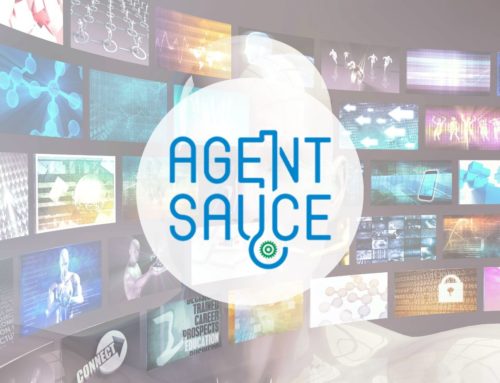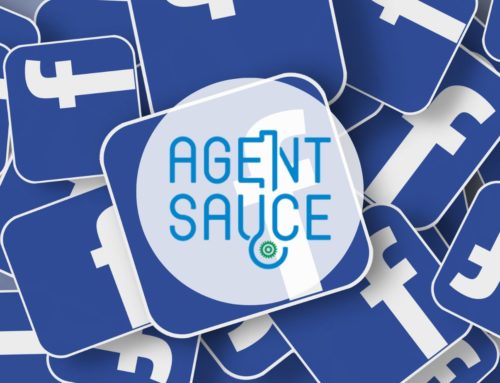We discuss what Blockchain technology is and how it can used in the real estate industry for to provide greater transactional security.
Blockchain in Real Estate Podcast Transcript
Adam Small: Hi there, Adam Small here with Agent Sauce, and this is the real estate marketing podcast. With me as always is Doug Karr.
Douglas Karr: The Doug Karr.
Adam Small: The Doug Karr. The one and only. Thank God for that.
Douglas Karr: You said the real estate marketing podcast, so I was like, the, the only one.
Adam Small: Well we are … It doesn’t matter if there are others, we are the real estate marketing podcast.
Douglas Karr: At least the one to listen to.
Adam Small: Exactly, exactly. So today Doug, I was thinking that we kind of take a little bit of a tangent and talk about a technology that a lot of people probably heard of, don’t really quite understand what it is. Talk about how it can be used for real estate, it’s not necessarily a marketing technology, although there are marketing uses for it. But, I want to talk about Blockchain.
So, for those of you that don’t know, Blockchain is the foundation for like crypto currencies like bitcoin and Ethereum and that sort of thing. But it is not in fact its own crypto currency, it’s just a public ledger for them.
So, want to talk about that a little bit, and [crosstalk 00:01:07]
Douglas Karr: A distributed public ledger.
Adam Small: Well, there are a lot of features there that are great, and that’s one of them that makes it so great. So want to talk about that and talk about what it can do for real estate. So, you touched on one aspect of it already, which is distributed, and by that you mean?
Douglas Karr: Well, the basis of blockchain that’s really fascinating, and people are really even still picturing on how it can be utilized is that, right now, if you get your money from a bank, or you get your money, your credit card, your number is in one location right. If it’s credit card, the credit card company has that number, and that number is, that’s who you have to authenticate. All people have to do to use your credit card is to steal that number, or break into the one bank that has ledger where your credit card exists.
And so there’s two locations. Them and you. And so the cool thing about Blockchain is basically that your identifier has all of the components of where to go look for clues, breadcrumbs if you will, of where all the other data is.
Ad so the information is not found in one place, it’s found maybe in hundreds of places, or thousands of places. And so in order to validate …. If I went to go use your credit card, it would validate that I was who I was, and it would verify it through a number of different places. And so the great thing about it is I can’t fake that, right. I can’t fake putting all the servers up and putting all that information out, and then write the Blockchain to go check in the right places. It’s impossible to crack that.
Now, there has been security problems and that’s where people have stolen the wallet, and that’s-
Adam Small: Right, but that’s not a fallacy of Blockchain-
Douglas Karr: Right.
Adam Small: Itself, that’s a fallacy of the security of the person who held the wallet, right.
Douglas Karr: Yeah, exactly.
Adam Small: So, Price Waterhouse Coopers defined the Blockchain as a distributed, decentralized, which is what you’re getting at, it’s not in location, transaction ledger. So it’s a … Bitcoin uses it to keep track of who owns what.
Right, the other piece about it is that it’s immutable, resilient and secure. Immutable, meaning that it really can’t be altered without the secure keys like the keys to your home, you have a key to your Blockchain. And if you got in this case, 50 Bitcoin in there, it can’t be changed and they can’t be changed unless you use your key to change that, right.
Doesn’t matter who gets a hold of it, the ledger or whatever, they can’t do anything unless they have that one key-
Douglas Karr: Exactly-
Adam Small: That you have in order to change it right. So it’s really quite secure because of that, and resilient because it’s distributed, nothing is in one location. So if a server goes down in the US somewhere, it doesn’t matter because it can be picked up another region, and you’re not going to lose whatever you have stored in there.
So, this goes back to how do you use something like this for real estate right. Because you’re talking about storing bitcoins in the ledger and stuff like that, but how to use it for real estate. There are a lot of applications for real estate marketing
Douglas Karr: Well, you think about when you buy or sell a home, how much paperwork and how many different places that you have to go to for information, right?
Adam Small: Right, right.
Douglas Karr: You’ve got to go to hundreds, and so the thing is again, if all of this was available through Blockchain mechanisms, you could go buy a house and just pull out on your phone or whatever, your Blockchain wallet, it could go back and validate all of the data. You’re-
Adam Small: Right. Well there’s the title search to verify that the person actually title to the property, the listing. There’s all of the research that goes into what’s been done to the house, the inspection and all that stuff. You can literally look up the entire history of everything. It’s there and no-
Douglas Karr: And that’s the mining aspect that people would have to go through, is, they would have to … And so it wouldn’t be like instantaneous where you press a button. But, once you initiated the purchase or whatever, it would basically go out and start verifying and validating every single element, and so, you could never sell the same home twice with a fake title certificate.
You could never … You might even be able to have it … Like the future of Blockchain which is pretty fascinating is, you said it just there. You said well, maybe the home inspection and maybe even the maintenance history of the home is available through Blockchain.
The fascinating thing then is maybe you don’t negotiate for house anymore. Literally, the house’s price is based on the factual … All of the elements of the Blockchain, which is pretty fascinating. So you would get told basically by the system, we can’t loan you this much money because the house is only worth this much, because of [crosstalk 00:06:18] the age of the air conditioner and the this, and the that.
Adam Small: Well that’s an interesting point. I think that the other aspect that’s really a great thing to think about is the fact that you would be able to have the entire history of the listing, right. So you’d be able to look at it from a verified proof. One of the things they do is a title search to verify that there’s no [inaudible 00:06:44] or anything like that against the listing, so there’s a clean title, that this person has the right to the title. Stuff like that which takes a while now, right.
So, this is a technology that could immensely speed up that process, right. And then in addition to that, you know without a doubt that this was in fact verifiable information.
Douglas Karr: Yeah.
Adam Small: So that’s one way that it could be done.
Douglas Karr: Yep. The other one is real estate agents. If you’re a great real estate agent and every transaction that you’ve placed, bought or sold a house is in the history, now it’s total transparency as far as how good a real estate agent you are.
Adam Small: Right. What your transaction volume is, what you’re working on, you’re able to go in with verifiable proof. If somebody wanted to look it up, they could verify it as long as they had access to the Blockchain itself, right.
The other thing there too, something that’s recently been going around the last couple of years I should say, is fraud. It’s a great fraud prevention tool. What we see now, one of the things going around is that hackers will get into an agent, a real estate agent’s email, and they’ll sit there and wait for a closing.
And then, the day of the closing, a couple hours before, they’ll fake an email to the buyer and they’ll say oh, the wiring instructions have changed. Now you need to wire your deposit to this address instead. To this … Not this address but this bank account instead right.
And so the buyer’s typically frazzled or whatever, and the scammers will put something like, I’m in a meeting so please don’t call or whatever. And buyers, they’re frazzled, they’re trying to get this closing down, they’re excited and they trust their agent, and they didn’t notice that the email address was one letter off or something, especially now that a lot of email clients hide the email address and just show the name, right.
So they wire the money out, hundreds of thousands of dollars or whatever it is, and it’s gone. It’s in the ether, it’s gone. So they’re unable to get it and then they don’t have the deposit for their home.
So, that’s a big fraud thing going on now, and I look at it and I go, from an agent perspective, establishing a secure communication channel is vitally important.
Douglas Karr: Yeah.
Adam Small: Because email is, email’s pretty easy to [crosstalk 00:09:08]
Douglas Karr: It’s wide open.
Adam Small: [crosstalk 00:09:10] right?
Douglas Karr: People don’t realize that it’s a total … If someone is monitoring your network, email is going by in plain text. No encryption.
Adam Small: So, I feel like Blockchain technology could be something where you could set up a secure communication channel, where you’ve got your key, and the agent has their key … The customer has their key, and you’re just passing communication back and forth through the Blockchain. And you have verifiable evidence that yes you as the agent sent this and then security and trust on the other end that this actually came from the agent, so they know that it’s verifiable good information.
And there’s a ledger of it too, so that, say an agent did send the information and it was wrong, then there’s proof that that was wrong. Or on the other side of it, there is proof that the agent never sent anything and the person responded when they shouldn’t have.
Douglas Karr: I mean it’s fascinating. From a marketing aspect, it’s really good too like advertising. Right now, ad fraud is huge. So, for people that don’t realize that there’s literally people that create server farms, and bring these sites up, put them on Google Ads, Ad Words and ads sense I should say, and basically fake websites to get ads, and then click on them. So that their website gets a little bit of money, gets a little bit of money. And they’ll create tens of thousands of these you know-
Adam Small: Well with [crosstalk 00:10:53] it’s pretty easy to do that.
Douglas Karr: Yeah. And so it’s a … I think they say something like 35% of all money now spent on advertising is pretty much fraudulent. It’s someone clicking that shouldn’t be clicking, or a machine or whatever. And so that it’s another one where, the fact that you would be able to track down every single click, where it came from, how it got there.
Adam Small: So make your ad spend less. You’ll be able to save a ton of money on your ad marketing. And not only that, you’d know that your ad marketing was going toward something valid. So it’s two fold right? You’re not spending that money, 35% of you spend, and, you know that-
Douglas Karr: You know where-
Adam Small: Where you are spending is in fact being targeted properly.
Douglas Karr: Exactly, exactly. You know exactly where it came from. The barriers now that they’re working on are speed obviously. If you open up a web page, you notice that the ad loads almost as fast as the website which is pretty amazing.
So when you’re starting to log Blockchain in different ledgers and everything else, the delay is significant. In fact, the energy that it takes is significant right now.
And so they’re trying … Now they’re creating processors that are fine tuned just for mining and everything else to try to speed up those mechanisms. But once those mechanisms get really fast and these systems get efficient, this technology is going to be maybe a little bit scary, because of the transparency that it will provide. And maybe a little-
Adam Small: Well I don’t know, you can set up your own personal Blockchains, can you not?
Douglas Karr: Yeah, you can.
Adam Small: So, and my point there is that, say an organization or a brokerage wanted to set up a Blockchain for secure communications right, they wouldn’t have to provide the transparency to anybody and everybody.
Douglas Karr: Right, right.
Adam Small: But they will still have [crosstalk 00:12:51]
Douglas Karr: Well no, I mean-
Adam Small: That information from a ledger perspective[crosstalk 00:12:53]
Douglas Karr: I mean the transparency site is that, humans are flawed human beings. And so they … We do things bad, and we say things wrong, and we do things … Well with Blockchain on everything-
Adam Small: It’s immutable, it’s unchangeable. So the moment you do it, it’s [crosstalk 00:13:11] set in stone almost, right.
Douglas Karr: Your entire history is available, and so that’s where … So if you … Look, I know the housing market went through a huge thing years ago because people were hiring therein inspector for the house and their mortgage broker, and selling houses that shouldn’t have been sold and stuff-
Adam Small: To people who shouldn’t have been buying [crosstalk 00:13:38]
Douglas Karr: Yeah. Well, Blocking would have destroyed that. It would have never happened that way-
Adam Small: Because of the verifiable person on the other end and their income and all the other factors around that. And then on the housing side of it as well, they would have been able to inflate the price and say, sure it’s worth $200,000, when it’s only worth $100,000, because of the history and the-
Douglas Karr: And look, the other side of it too is mortgage brokers and inspectors and real estate agents, we all want to close on the house. And so, I don’t care if the term is a little bit off, or this is a little bit off. And if they leave it off the paperwork, fine, I’ll fix it when I buy the house or whatever.
Well, that kind of stuff won’t be … You won’t be able to omit that stuff anymore. Everything is going to be logged and categorized and indexable and searchable, you know.
Adam Small: Right. Which does lend itself from a fraud perspective as well. Because, you get your house flippers and some of them are amazing, and they go in and they really gut the thing and they bring it up to code and make sure that they spend the money right and all that. And then others, not so much. It’s a-
Douglas Karr: Like my house where I had a radiator hose on the back faucet under the house.
Adam Small: Not sure I heard about that.
Douglas Karr: Yeah, so someone literally … There was probably a pipe leak or whatever, and whoever it was just put a radiator hose with hose clamps out to the faucet. And we didn’t find out until the middle of winter when the hose burst.
Adam Small: Yeah, stuff like that.
Douglas Karr: But that transaction would have been identified and logged, associated with the house, associated with everything. And so it’s pretty fascinating technology, it’s really going to … I think it’s really going to transform business transactions just because there’s going to be a level of honesty and trust there that we’ve never had before.
Adam Small: Right so it’s going to provide like you said, level of trust and transparency across the board. Not just in a marketing or even a housing informational store, but also, business transactions in general, from the bank right to your bank account to your wallet. Very interesting stuff. Anything else on Blockchain that you want to mention Doug?
Douglas Karr: No, I mean that’s pretty much it. For people that … Obviously everybody associates it with cryptocurrency right and all, just because that’s the leading use of it right now. But that is by far not it. The exciting ones for me are the fraud prevention on advertising and marketing. And then the sales contract negotiation is a fascinating one too, that these people are really working on these systems now that will just go out and seek and find all the information that you need for a sale.
And that’s cool. I mean, imagine how much easier it’ll be to buy a house without the 400 pages of people work that you have to go through and collect, and everything else.
Adam Small: Yeah, exactly. And for me, I think that that’s the thing, is that Blockchain’s not just for cryptocurrency. It can have a huge impact on the ability, the speed, the verification, the trust factor of which you can in real estate case, buy sell homes.
And also the comfort of knowing that, yes, the money’s going to the right place at the right time, and it’s for the right purpose. Meaning that, they didn’t over buy on this house or they didn’t … They’re not going to end up with a lemon of some sort, if you can use that term for a home right.
So, great. Well, I think that’s probably our final point there is that-
Douglas Karr: Yeah. If people are interested, they should probably read a book on Bitcoin or something. Because, it will start out with what is Blockchain technology.
Adam Small: Exactly. So Blockchain is not just for crypto currency right?
Douglas Karr: And the one to keep an eye out is, Ethereum is a crypto currency. However, it’s being utilized for a number of these different efforts. It’s not just money, it’s being used for a validation process. And so that’s a good one to kind of keep an eye out on.
They’ve got problems with it too that I’ve been reading about, but, it’s probably the first one that I think its main objective wasn’t to be used as currency, it was to be used as a validation technique for identification in transactions.
Adam Small: Cool. Well Doug, thanks for joining us today, appreciate your sharing your Blockchain knowledge. If you guys want to learn more, feel free to contact us an info@agentsauce.com, or check us out online at agencysauce.com. Thanks, and have a great day.







